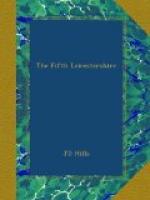On the 2nd March, having received a draft of three N.C.O.’s and 106 men, we went once more to the line and took over from the 4th Lincolnshires. This time we were able to have two Companies in front, one in Boisselet trench, part of the new work, and one in reserve, a far more satisfactory distribution. The trenches were still in a very bad state, and it was found in many places quite impossible to dig new lines, because the ground had been so shaken by continuous bombardment for more than a year, that the soil would no longer bind, and the sides of any new trench collapsed almost as soon as they were dug. The tour was fairly quiet, though Boche snipers and artillery were more active than before, and we reached Camblain L’Abbe at the end of it without having suffered any repetition of the trench mortar bombardments.
Our six days’ rest included two big working parties, two inspections, and one demonstration, to say nothing of such minor details as church parades, conferences, baths, and the usual overhauling of boots and clothing. The work consisted of clearing dug-outs in the Bois des Alleux, and only lasted two days, after which we polished ourselves for General Kemp, who inspected us in a field near Camblain, and said that he was much pleased indeed with our turnout. General Montagu-Stuart-Wortley was equally complimentary at the second inspection, and congratulated all ranks on their appearance and smartness, which, considering the state of the trenches, was very creditable. The demonstration was particularly interesting, and proved the futility of the famous German flame projector. As many men as possible were placed in a trench, while the demonstrator, standing at 30 feet away with the machine, turned on the flame. The wind was behind him, and the flame, with a tremendous roar, leapt out about 30 yards. But the noise was the worst part, for the burning liquid, vapourising as it left the machine, became lighter than air, and in spite of all the efforts of the Demonstrator, could not be made to sink into the trench, whose occupants were untouched. The men were all rather amused at the whole performance and suggested that we should bring the machine into the line to warm them up on cold days.
On the 12th we marched once more to the line and relieved the 4th Lincolnshires, this time for a four-day tour. We found on arrival that the Boche a few hours previously had blown a large mine in the left sector, to be occupied by “D” Company (Shields), so that in addition to the work on the new trench, we had to supply many men for repairing this new damage—no light task, for many yards of our front trench had disappeared. To make work more difficult the Boche was continually throwing bombs and rifle grenades to try and catch our working parties, and it was only after two days’ vigorous retaliation that we taught him that it was wiser to keep quiet. The leading spirit in this retaliation was Captain Shields himself, who would




